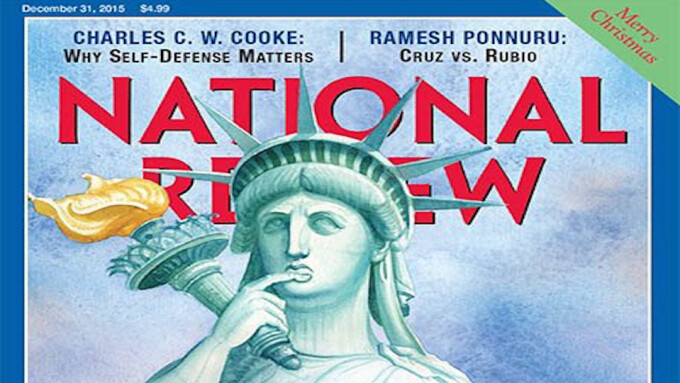NEW YORK — Leading conservative magazine National Review today published a column questioning the ability of 'young women' to consent to sex work.
The article, entitled "Doing Porn: Is Consent Enough?" was penned by Madeleine Kearns, a Scottish singer who is also a William F. Buckley Fellow in Political Journalism at the National Review Institute.
Kearns claims that "young women deserve more than 'it’s your body, your choice' platitudes" and compares the situation of women who choose to do sex work, including performing in porn, to Jane Austen heroines.
"In a Jane Austen novel, a woman is bestowed with a fixed sum of (shall we say?) erotic capital which she can either save, invest, spend, or (in desperation) sell," Kearns' column begins. "The prudent woman considers carefully whether to accept or decline an offer of marriage and is kind enough to advise her sisters to avoid doing something foolish like running off with a soldier, marrying a pauper, or getting pregnant out of wedlock. Those were strange and frugal times. But human nature — including sexuality — has barely changed at all."
Making it obvious that her sense of "proper behavior" for women predates even the Victorian era, Kearns has this peculiar "scarcity of resources" economic and Darwinian argument for sexual activity that permeates the entire column.
"Today, there are those among us who, occupying new heights of mendacity or mercenary guile," Kearns writes in the overwrought style favored by young contributors to the William F. Buckley-founded political magazine, "argue that a young woman has little to lose, and perhaps even something to gain, from selling everything for next to nothing — behaving like a stripper, prostitute or porn star."
Kearns then uses the Girls Do Porn case, concerning an enterprise accused of deceitful acts which have nothing to do with standard practices in the mainstream porn industry, to attack the idea that women can consent to sex work.
"While the villain in this story is obviously the company and its founder, Michael Pratt, now wanted by the FBI for federal sex-trafficking offenses, and perhaps the added wrongdoers of those indifferent consumers — the psychology of the victims is a little more complicated than the 'consent' narrative suggests," Kernes writes.
"Indeed, it is hard not to wonder what, exactly, these young women were thinking when they (ostensibly) agreed to participate in the porn videos after realizing they’d been enticed under false pretenses. After being told that the job was porn, and not modeling, why didn’t they flee immediately? Was it that they were afraid to say no? Or that they found the experience, on some level, exhilarating?"
Kearns then addresses the obvious issue with those questions — which is that she is unequivocally blaming the women who were, according to both a civil court in San Diego and an FBI criminal complaint, defrauded by the Girls Do Porn owner and employees.
"We must be free to consider these questions without facing charges of victim blaming," Kearns decrees in self-absolution. Instead, the question she really wants to decry, in her own words, is how "porn culture" has "insidiously and thoroughly... infected the mainstream."
To read the National Review's latest War On Porn column, click here.







